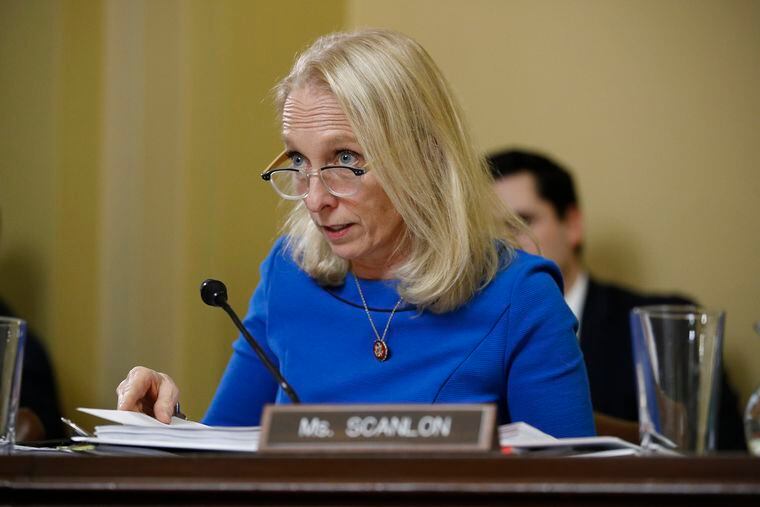
Tech titans like Google and Facebook dominate the digital economy with vast troves of data gathered from consumers and businesses.
But what if users could easily take that data — such as photos, friend lists, or customer reviews — and move them to a rival platform? Would that boost competition and curb the market power of America’s “Big Tech” giants?
That’s the concept behind a bill sponsored by U.S. Rep. Mary Gay Scanlon (D., Pa.), one of the lawmakers leading an ambitious antitrust effort in Congress. Earlier this week, the House Judiciary Committee advanced Scanlon’s bill and five others that target Amazon, Apple, Facebook, and Google.
The bills are the culmination of a 16-month congressional investigation that found the digital economy to be highly concentrated, with just a few firms controlling the markets for online search, social media, or advertising. The proposed laws would bar big tech companies from favoring their own products on their platforms, prevent them from buying businesses that are competitive threats, and increase filing fees for mergers to fund federal antitrust enforcement, among other things.
“These new-age monopolies have grown quite rapidly and without regulation, but now we’re seeing serious impact on Americans and on small businesses,” Scanlon, a Democrat from Delaware County, said in an interview Friday. “The time has come to do something about it.”
Scanlon’s bill deals with a more wonky topic: data portability and interoperability.
One of the reasons large technology firms maintain market power is because it’s hard for consumers and businesses to switch services, supporters of the bill argue. For example, a social media user might not be able to download photos or personal information and easily move them to another site. Instead, the user would have to start from scratch, re-uploading the content and information accrued over years. Even if a consumer is unhappy with an incumbent platform, the high “switching costs” could prevent them from leaving.
There are serious implications for small businesses too, Scanlon notes. A company selling its goods on an online marketplace can effectively be locked in if they can’t transfer their positive reputation — the five-star ratings and customer reviews that lure consumers to their products.
“Whether it’s Amazon or Google or Facebook, they have their reviews, they have their client contacts,” Scanlon said. “[Small businesses] get trapped into those large platforms.”
Scanlon’s proposed solution is to require the largest tech companies to make user data easily portable. That would not only benefit consumers, but also give new entrants access to data needed to grow and compete.
The legislation would also mandate data “interoperability,” so users can communicate across competing services. Scanlon compared the concept to email, where users of Microsoft Outlook can send and receive messages from Gmail users. The bill would require companies handling the transfer of data to do so securely and privately, too. Much of the details would be left to the Federal Trade Commission, which would write and enforce the rules.
Facebook has pushed for data portability laws and in April expanded the types of info users can transfer to other services, though critics have said the company still hasn’t done enough. In 2019, Facebook released a report that raised questions about whether some data — like a user’s contact list — should be portable since it would include information about users who did not opt for the transfer.
A Facebook spokesperson did not address Scanlon’s legislation in an emailed statement, but called the entire antitrust package “a poison pill for America’s tech industry.” In a letter to lawmakers, Apple said interoperability mandates “severely burden platforms’ incentives to innovate” and would give third parties a “free ride on Apple’s investments and hard work.” Amazon and Google officials did not return requests for comment.
“Antitrust laws should promote competition and protect consumers, not punish successful American companies,” the Facebook statement said. “The surest way to address the challenges facing today’s internet is to tackle the areas of greatest concern to people like content moderation, election integrity, and privacy – not attempt to dismantle the products and services people depend on.”
The antitrust legislation’s future remains uncertain in the Democrat-controlled Congress. The effort has already faced intensive lobbying and pushback from lawmakers in California, where three of the tech titans targeted are headquartered. But Scanlon noted the bills have bipartisan support.
“This is something that impacts Americans across the country and legislators of both parties are concerned,” she said.








